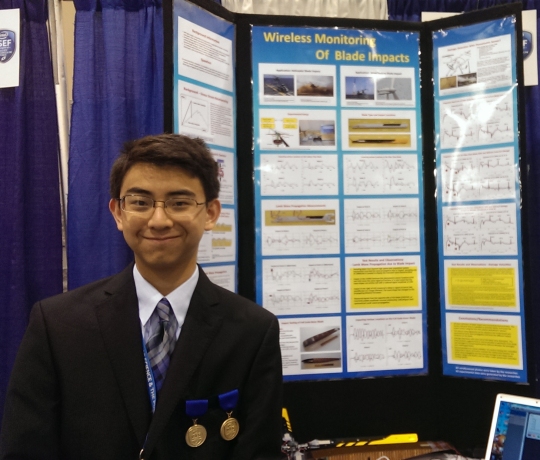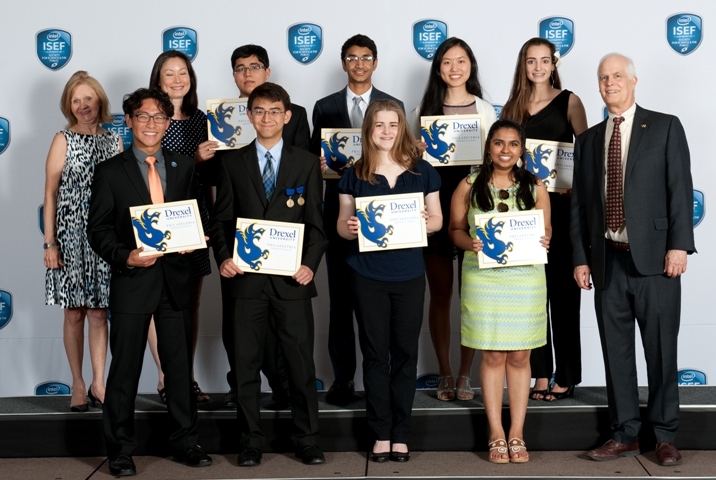Yu first became interested in science fairs during his 6th grade school year. His first project was a simple physics problem involving a bumper test as an object fell down an inclined plane.
This year, Yu's junior year at GMHS where he participates in the STEM Academy, he presented a project titled "Wireless Sensing of Blade Impacts." Unlike freshman and sophomores, juniors in the STEM Academy are not required to enter the science fair, but Yu felt that something was missing and "just wanted to do it again", he said, "Other students always find science fair as a burden, but I see it as an opportunity to do better."
Yu figured out a way to narrow down the search for damaged spots on turbine and helicopter blades, damages that could be caused by birds, bats or debris from taking off and landing. Usually, inspectors need to look closely over an entire blade to scout for signs of damage that might need repair; and that's not only time-consuming, but also costly, Yu noted.
At first, Yu placed two sensors on each blade, one located near its base and the other near the tip. The sensors would detect vibrations created as objects slammed into the blade, allowing Yu to measure when the first vibrations reached each sensor, much like a seismometer pinpointing an earthquake. But when Jonathan ran tests on his scale models of helicopter blades, he noticed that he could pinpoint the impact by simply analyzing the shapes and sizes of the vibrations—not the timing, meaning he would only need one sensor located near the base of the blade.
 On top of his junior level course load, Yu continued to put in hours of work each week towards the completion of his project, which included creating a detailed display to showcase the extent of his research during the months leading up to his first science fair of the year.
On top of his junior level course load, Yu continued to put in hours of work each week towards the completion of his project, which included creating a detailed display to showcase the extent of his research during the months leading up to his first science fair of the year.To collect the data, signals from the sensor could be sent wirelessly to a recorder on the aircraft, or those signals could be sent to instruments on the ground. In either case, the data could be preserved and analyzed in the event a blade is struck and damaged.
At the Great Mills High School Science Fair, Yu's project was awarded first place in physics and astronomy. At the St. Mary's County Science and Engineering Fair, Yu received a number of awards, including the 2016 Unmanned Systems Chief Engineering Award presented by TPP and the 56th Annual St. Mary's County Science and Engineering Fair Grand Award.
Following the county science fair, a select group of students were invited to participate in the Prince George's Area Science Fair. Again, Yu received a list of awards and took First Place in Physics and Astronomy, as well as the 68th Annual Prince George's Area Science Fair Grand Award.
For most students this is where the science fair season ends, but Yu had one more stop before his season was over, the Intel International Science and Engineering Fair (Intel ISEF).
The Intel ISEF is the world's largest international pre-college science competition. Approximately 1,750 high school students from more than 75 countries, regions, and territories are awarded the opportunity to showcase their independent research and compete for approximately $4 million in prizes.
This year's Intel ISEF was held on May 13 in Phoenix, AZ. For Yu, this was his second Intel ISEF competition, first competing in Pittsburgh as a sophomore in 2015. Although Yu's 2015 project did not receive any awards, he was able to learn from the experience and gain valuable knowledge to aid his efforts during the 2016 competition.
At the 2016 Intel ISEF, Yu was selected as a 2016 finalist and received the 2016 Special Award from Drexel University, which includes a full, four-year scholarship. Yu was one of eight students from around the nation who received the special award.
The future is bright for this young engineer. Although he now has a full scholarship to Drexel, his destination for college still remains open. This year, Yu will be putting the science fair scene aside as he prepares for college and applies to his selected schools, which he says includes University of Maryland and Johns Hopkins University.
Yu is planning to major in Electrical Engineering or Computer Science, and is even playing around with the idea of completing a dual degree in both. He is also planning to minor in business administration helping to round out his education and inspire entrepreneurship.
This summer, Yu will be participating in the supercomputing internship program at Pax River. He hopes that the internship will provide him with information allowing him to gauge his interest in computer science.
For now, Yu will remain busy as he devotes more time to robotics and captains the GMHS VEX and Botball teams in the coming school year.



